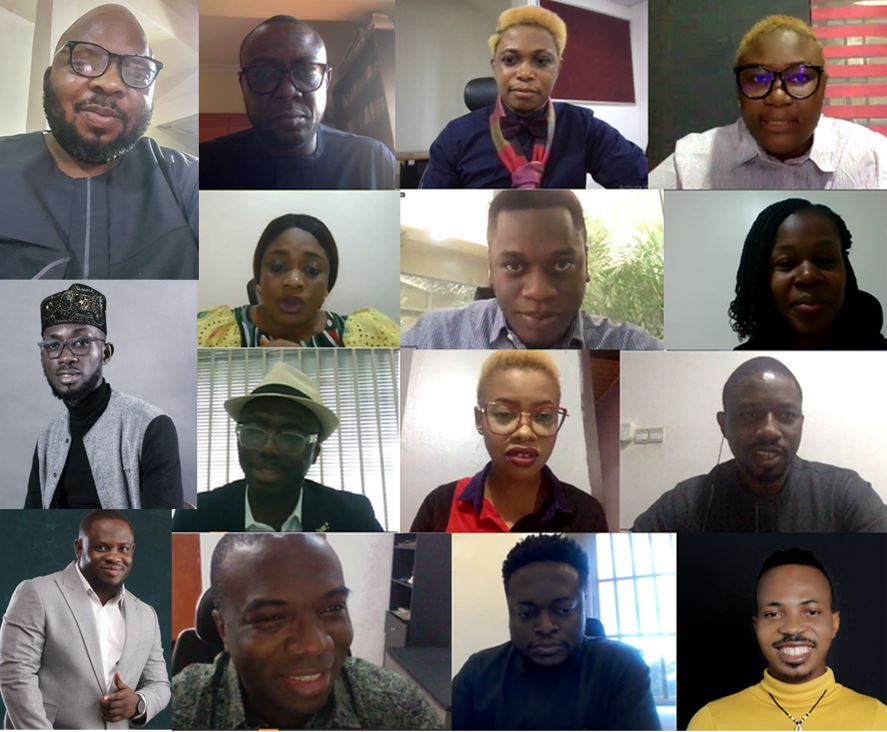By Abimbola Mohammed
Integrated Marketing Communications stakeholders have canvassed digital pathways for practitioners and brand custodians in Nigeria’s marketing and advertising ecosystem. The creative corridors were suggested during the just concluded Second Quarterly Virtual Summit where top industry experts, gurus and titans dissected the theme: “Winning in the Digital Economy: The Purpose Question and How to Win the Reluctant Consumers” and “Digital Advertising Versus Traditional Media: The Conversion Rate Challenge.”
The second edition of the quarterly virtual summit, which was held virtually via zoom and YouTube, had over one thousand participants from Nigeria, Ghana, London, United States of America and many more locations.
John Ajayi, industry authority and Managing Director/CEO of MARKETING EDGE, in his welcome speech enunciated the goal of the Summit, describing the initiative as an effort at reinforcing the MARKETING EDGE brand as a strong, innovative, creative and digital savvy agenda setting media platform.
In his words: “The need for constant exchange of marketing and advertising knowledge with a view to leading conversation on contemporary industry issues is the rationale behind the Quarterly Summit.”
In his opening remarks, Akin Adeoya, the moderator of “Winning in the Digital Economy: The Purpose Question and How to Win the Reluctant Consumers”, who is also the Managing Director of Marketing Mix, one of Nigeria’s foremost Public Relations firms, said consumer engagement is beyond customer transaction, adding that it’s vital for retailers to engage their customers whenever they can. “You have to build personalised customer relationships, use social media for consumer support and dedicate your attention to your customer.”
The Founder and Managing partner, Open Square, Feyi Olubodun, during his presentation at the Summit, said the way to engage reluctant consumers is to penetrate beneath the surface (BTS), adding that the youth are the most active in the digital space, which is why they are called the digital nation and they are the real consumer.
Mr. Olubodun added that brands should leverage the digital space to reach the young consumers as the population of Africa youth was put 16% of the global population in 2015 and projected to grow two and half times more by 2060, thus increasing the share of the global population to 29% or one third of the total global population. Therefore brands need to identify which consumer they are selling and also identify the medium they are using to reach the target audience for their products.
In his words: “As a brand you must identify what makes your consumer different not what makes them the same. Often when digital strategies are being developed, we focus more on what makes consumers the same by joining trends, instead of identifying your consumers and getting what is different about them digitally and tapping into them.”
He advised that content creators should follow the steps of comedy content creative as they are able to create different kinds and formats of comedy online that are very unique to them and still get the attention of their target audience as some of them are very distinct in their language and format.
Speaking on the theme: “Winning in Digital Economy: The Purpose Question and How to Win Reluctant Consumer, the Strategy and Planning Director, Insight Publicis, Mr. Franklin Ozekhome, said for organisations to thrive in a digital age and win their target consumers’ mind, they must connect by ensuring that whatever they are putting in the marketplace is from the consumer point of view.
In his words: “Digital transformation doesn’t exist in a vacuum. I think we usually miss the point when we talk about how we can transform and ensure or connect with the new age consumers. Organisations should look at the issues that consumers are going through, why consumers should care about their (organisations’) product and services, what consumers are doing presently and what they would do next and think of the role that they as a brand, product, service or platform will play in the life of consumers on a day to day journey.
“I believe that is the best way to always interact and engage with the consumer. Rather than trying to advertise or market to them from brand perspective or viewpoint, brands should ensure they deal with the consumer’s mind-set.”
He explained that we live in a new world where competition is no longer by category definition, “If your brand is targeting the youth and you are into beauty products, then another brand, let’s say telco is also targeting the youth. Then the telco becomes your competitors because everyone is targeting that share of the market, that share of fight.”
He urged brands and agencies to redefine their purpose to suit what their target consumer needs, not just the vision and mission of the brands such that the reluctant consumer can then become a loyal consumer.
“Look at the role of your brand in the life of the consumers. As they are living their life as it is, how can I amplify their aspiration, their ambition? Where are they headed to? Which tools can I create to help boost their ambition that is the best way to connect to them? If you successfully do these, then these reluctant consumers will connect and gravitate towards you because you understand them. it is no longer about selling but ensuring that they also trust you and feel like your brand is authentic to their needs.”
For Emeka Obia, the Lead Strategy and Planning, Leo Burnett, times have changed and culture is also changing at frenetic speed. There is so much connection enabled by technology that has happened on the continent and we have to move at that pace.
Mr. Obia said: “Because of what the world has faced especially the pandemic and more realities that we see today, it has become really critical to try to understand people, try to build our products, services and campaigns in such a way that we can connect and show empathy and clear understanding of the people that we are to relate with.”
He added that at the point where we are today, brands should move beyond what they are used to and what they stand for because we are in the era of what people interpret a brand to be based on what the relationship they have with the brand.
“One of the key things for brands today is ensuring that they begin that journey of building cultural equity, how to become more relevant in culture, how to become more relevant in people, how they are identifying the opportunities that exist today. This is the time where culture all of a sudden has become the front burner now more than ever. Locals have become more important, people are looking for ways to express themselves, ways that they can do different things in a way that is true to what they believe in.”






Comment
No comments found.